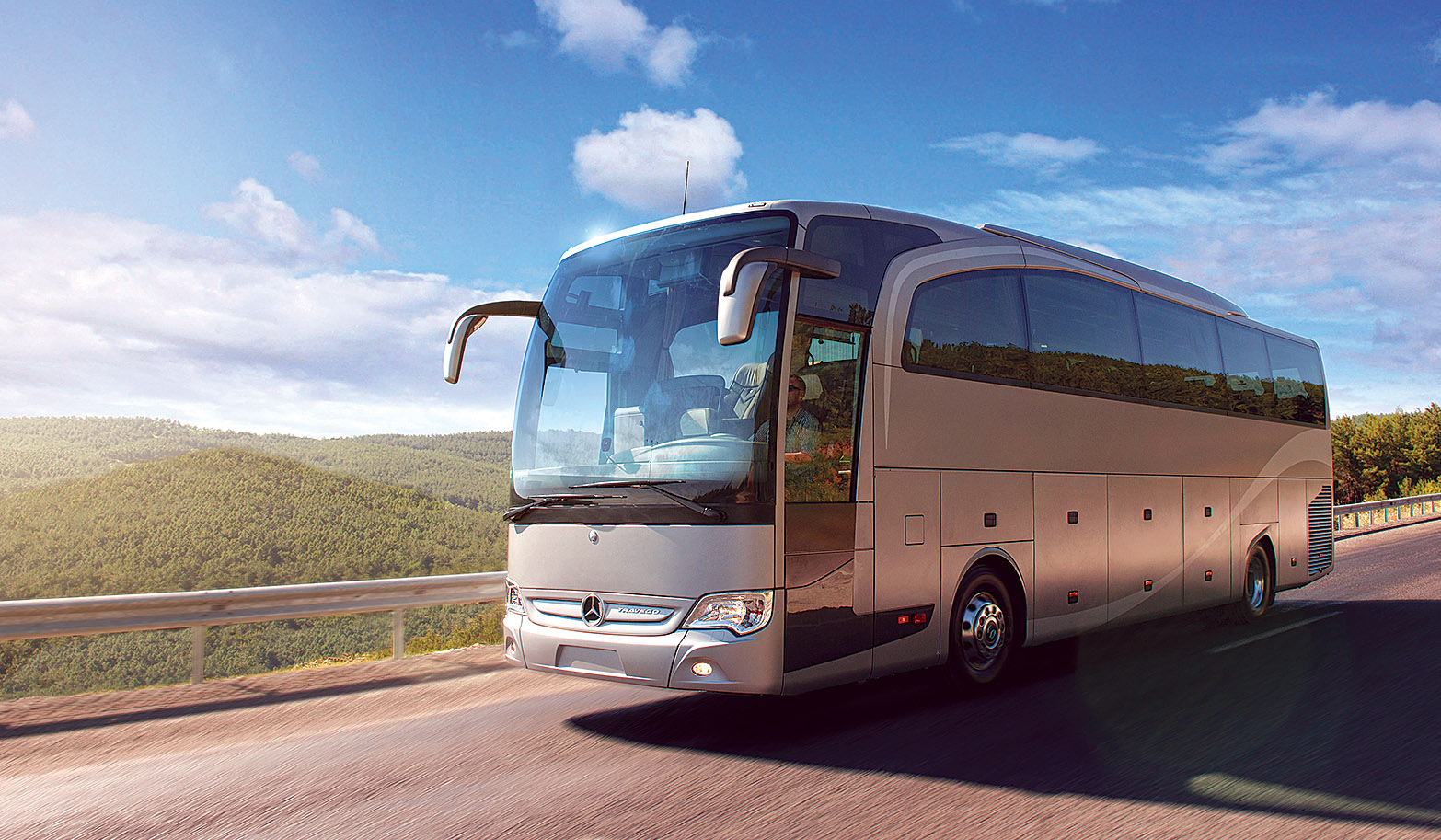
By Doug Jack
In my last International Report on Busworld, Kortrijk, Belgium, I wrote very little about the Turkish exhibitors. The largest numbers of exhibitors came from Germany, China and Turkey. Three weeks after Busworld, I went to Turkey to visit a factory and catch up with developments in the market. My trip included attending the Comvex exhibition of all kinds of commercial vehicles, from light vans upward.
Otokar
Otokar, one of the first bus manufacturers in Turkey, celebrated its 50th anniversary in 2013. The company has a large and very well-equipped factory at Sakarya, about two hours east of Istanbul, where it manufactures a wide range of military vehicles and a growing family of buses and coaches. Otokar is the largest Turkish manufacturer of mid-sized vehicles widely used in smaller towns on suburban routes and rural services.
Otokar has progressively extended its range and expanded into export markets. Products now include low-entry midibuses, full-size low-floor city buses and higher-floor interurban models. Last year, the company won a contract to supply 750 Kent (the Turkish word for city) buses to IETT, Istanbul.
It is amazing how Otokar can take on and complete sudden high-volume orders. It can only be done because the factory has flexible management and a highly-skilled workforce that has been trained on the full product range. They can switch between very different products while still maintaining the required quality standards.
Mercedes-Benz
The largest bus and coach factory in the country is that of Mercedes-Benz, based near Istanbul. In 2013 it came close to its annual capacity of 4,000 units, a mix of city buses, interurban and luxury coaches. The company is now proceeding with plans to increase capacity to 5,000 units annually. Mercedes-Benz has around 65 percent of the important market for full-size coaches in Turkey, used for both express services and tourism. Although low-cost airlines have started to provide competition, many passengers still prefer coaches.
MAN
Germany’s MAN has a large bus factory outside Ankara, the capital of Turkey. It formerly built higher-floor city buses for the domestic market and for export to neighboring countries, but now offers the more modern Lion’s City bus with either a full low-floor or a low-entry layout.
MAN also builds a range of interurban and luxury coaches in Turkey, including some that use the Neoplan brand. MAN builds many of these coaches for customers in Western Europe.
Karsan
Karsan specializes in assembling a range of commercial vehicles on behalf of international manufacturers. It has a modern and highly-equipped factory in Bursa, across the Sea of Marmara from Istanbul. Bursa is the automotive center for Turkey where several international manufacturers have their plants. The company has recently begun to develop its own indigenous buses.
A few years ago, Karsan entered into an agreement with BredaMenarinibus of Italy to build a wide range of city buses from 26-feet to 60-feet under license in Turkey. Karsan has even built some Breda models in Turkey and shipped them to Italy.
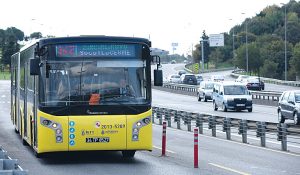
Karsan signed an agreement to deliver a mixture of 540 solo and articulated city buses to IETT, Istanbul, and included five-year full service maintenance and the construction of the second largest gas refueling facility in Europe.
Karsan has traditionally been one of the largest suppliers of minibuses widely used in Turkey. At Busworld, Karsan introduced the Jest, a low-entry minibus with an overall length of just over 19 feet. It had a Fiat Power Train diesel engine mounted at the front. Although more expensive than the older high-floor buses, Karsan expects the Jest to become popular because passengers will be able to get on and off more quickly.
Also at Busworld, Karsan showed the CXL low entry midibus and the MXPL midicoach. They had much in common, since both were built to an overall length of just under 27 feet. They had Fiat Power Train engines mounted transversely at the rear. The floor in the midicoach was at a higher level, giving reasonable underfloor luggage capacity. Both models are scheduled to go into volume production in the second quarter of 2014.
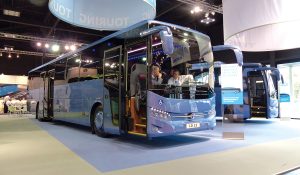
Anadolu Isuzu
Tthe Anadolu Group owns 51 percent of Anadolu Isuzu; Isuzu, 20 percent; and Itochu Corporation, 13 percent, with the other 16 percent of shares traded on the Istanbul Stock Exchange. The company began production of midicoaches in 1987 and shortly afterwards added a small municipal bus.
In recent years, the range has expanded considerably to include a low-entry Citibus midibus with a choice of diesel or CNG engines. Like all the Turkish manufacturers, Anadolu Isuzu is an active exporter that often benefits from the international Isuzu dealer network.
Temsa
The Turkish manufacturer probably best known in North America is Temsa. Its factory is in Adana in the south of Turkey. In Kortrijk, Temsa introduced the LD (Low Deck) coach range, available on two axles at either 40 or 43 feet. Various interior specifications are available, ranging from school bus to interurban coach.
Temsa has enjoyed success with its Safari HD (High Deck) coach. Temsa has sold large quantities to intercity operators in Turkey. There are plans to develop a model with an even higher deck to provide greater luggage capacity.
Temsa already supplies 30- and 35-foot midicoaches to North America and is soon to introduce its 45-foot model. The company believes it is the only manufacturer able to offer products in all three of these popular segments in the North American market.
Temsa also developed a full low-floor city bus, the Avenue, with diesel or CNG engines that are mounted vertically and offset in line at the rear. This arrangement is popular in Turkey because it enables the bus to have three double-width doors, facilitating faster entry and exit for passengers. Temsa has supplied the Avenue to Istanbul and several other Turkish cities. It’s also delivering a large contract to Rome.
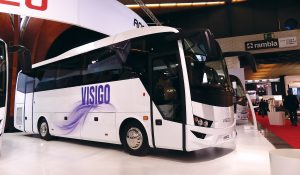
Other companies
There are other bus builders in Turkey, but they did not exhibit at Busworld in Kortrijk nor the Comvex exhibition in Istanbul. The largest is BMC, which also builds vans, trucks and military vehicles.
BMC stopped manufacturing a few months ago. BMC and a few other subsidiaries of the parent company were taken over by a Turkish government office during the summer because of unpaid debts by the holding company. The gvernment has resumed production of military vehicles but is looking for a new owner to invest in BMC. Large numbers of its Procity low-floor buses were seen in service in Istanbul.
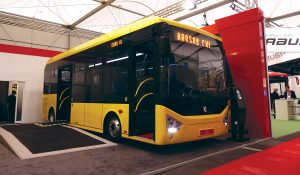
TCV is a young company established by two former executives of Temsa. In a most unusual arrangement, they assemble their Karat low-floor city buses with their own workforce in part of MAN’s factory in Ankara. They use MAN engines and axles, but they are nevertheless direct competitors!
Guleryuz is an established company that makes an extensive range of city and suburban buses, as well as coaches. They are the only company in Turkey currently building double-deck buses, either with open tops for city sightseeing or with closed tops.
Tezeller is yet another company that has branched out from mid-sized coaches to full size low-floor city buses. The brand has an unusual but distinctive styling, which certainly stands out from competitors on the streets of Istanbul.
